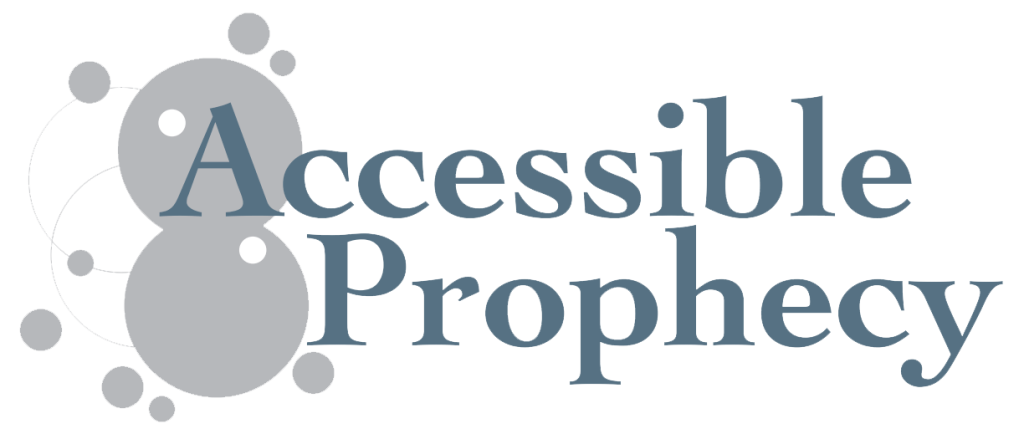My new book on the prophetic church is coming out later this year. Here’s an extract.
What does it mean to be a prophetic church?
When we have a clear understanding of what the prophetic is, then we can start to make sense of our calling to be a prophetic community. So, here’s an holistic definition of the prophetic; one that aligns with the biblical narrative and prophetic tradition, and that helps us take hold of our corporate identity:
The prophetic is about the faithful holding out of God’s reality, so that it can be clearly seen and responded to, so that transformation can take place, and so that relationship can be restored.
This holding out of reality – what we can call revelation – is at the heart of what God’s people are called to do; in fact, what we’ve always been called to do.
God’s people have always had a collective purpose in holding out God’s reality. We could even say that this is our defining role: a people who carry and demonstrate God’s reality to the world around us, a people who thus represent God. So, in a very fundamental way the people of God have always been a prophetic body – something we need to pay close attention to as we go on to consider what a prophetic church or organisation is.
We are carriers of revelation – the revelation of God – and this core purpose is at the heart of the biblical narrative. The Israelites, God’s people under the old covenant, carried the revelation of the One True God Yahweh – which was a pretty big revelation at the time. In fact, it was unimaginably radical in those days. The countries of the world were full of false gods and the abominations associated with them. Thus the revelation of monotheism was a startling light in the darkness: the God of love, the God of covenant, the Great I Am. This was the God who was Presence – cloud and fire – and the God who spoke: not an abstract concept or distant entity, but relational and communicating. The God of Israel was truly unique. ‘Hear, O Israel: Yahweh our God, Yahweh is one.’ (Deuteronomy 6:4)
The people of Israel were essentially a prophetic community because their primary task was to hold out this revelation to the nations of the world. Theirs was a most holy and prophetic calling: to represent Yahweh on the earth and be the embodiment of a people in covenantal relationship with him. God’s original intention for them was that they would be a nation of priests (Exodus 19:6), walking so closely with their God that they would hear his voice and represent him before all other nations (but of course at the critical moment on Mount Sinai they chose to hold back and have Moses as their intermediary).
This reality, this revelation of Yahweh, was so precious but so vulnerable to idolatry. Perhaps it’s not surprising that the one people group chosen to transform the world through its revelation struggled repeatedly to stay faithful to their call. At times they just couldn’t resist running to other gods and compromising the covenant relationship. Because idolatry pollutes, distorts and counterfeits the true revelation of God, it was, and still is, a central prophetic concern.
As we move from Old to New Testament, we see the people of God are still called to carry the revelation of God, but now with even deeper resonance. The church of Jesus Christ, God’s people under the new covenant, are called to carry the revelation of the Trinity. The reality that we now hold out to the world is the revelation of the family of the Godhead.The revelation of the triune God is at the heart of the gospel. This pre-eminent reality that we hold out to everyone is that within the unity of the Godhead there is a community of three persons:
• Our glorious Father who loves us unconditionally and extravagantly, and who invites us into his eternal embrace.
• Jesus our Saviour, the Light of the world, through whom we have redemption, forgiveness of sins and eternal life.
• The Holy Spirit, our ever-present friend and helper, who dwells in our innermost being to constantly bring us wisdom and insight.
A central theme of the New Testament is the unveiling – the making known – of the reality of the Trinity, and through it, God’s plan of salvation and restoration. This three-part personhood is unveiled to the world at Jesus’ baptism, where ‘Heaven was opened, and he saw the Spirit of God descending like a dove and alighting on him. And a voice from heaven said, “This is my Son, whom I love; with him I am well pleased.”’ (Matthew 3:16-17) The Trinity give us a picture of a perfect three-way relationship of pure, self-giving and eternal love. This is the reality of the God we worship. And it’s our responsibility as Jesus’ church to faithfully take this true revelation of God and hold it for all to see: ‘This is who God is and this is his reality.’
The ultimate goal of prophetic ministry is to reveal who God is; to reveal the truth of the nature of God to those who cannot yet see him. To reveal that they have a Father in heaven who loves them; to unveil Jesus their Saviour to them; and to introduce them to the Holy Spirit who will never leave them.
The prophetically-awakened church is a channel of God’s beautiful communication to his world: the means by which the world can hear the invitation to come back, to find your true identity, to meet the one who loves you with an everlasting love.

